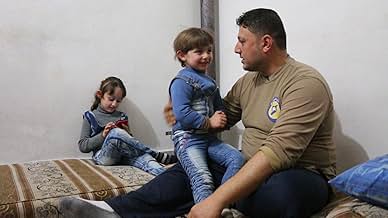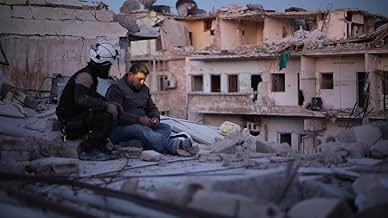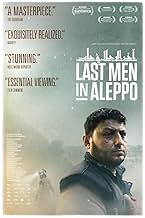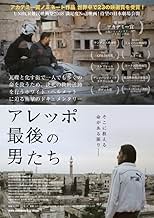IMDb-BEWERTUNG
7,4/10
3061
IHRE BEWERTUNG
Khaled, Mahmoud und Subhi haben sich freiwillig bei den Weißhelmen gemeldet, um das Leben hunderter Opfer im belagerten Aleppo während des syrischen Bürgerkriegs zu retten.Khaled, Mahmoud und Subhi haben sich freiwillig bei den Weißhelmen gemeldet, um das Leben hunderter Opfer im belagerten Aleppo während des syrischen Bürgerkriegs zu retten.Khaled, Mahmoud und Subhi haben sich freiwillig bei den Weißhelmen gemeldet, um das Leben hunderter Opfer im belagerten Aleppo während des syrischen Bürgerkriegs zu retten.
- Regie
- Drehbuch
- Hauptbesetzung
- Für 1 Oscar nominiert
- 26 Gewinne & 17 Nominierungen insgesamt
Mahmoud Alheter
- Self - volunteer rescue worker
- (as Mahmoud)
Empfohlene Bewertungen
10 stars for the bravery of the innocent children and men who risked there lives
Assad and putin prove there is no god . Just mass murderers who live in opulence as they slaughter children.
Assad and putin prove there is no god . Just mass murderers who live in opulence as they slaughter children.
If you like to watch dead children and assorted body parts being recovered from rubble, boy, do I have the movie for you! As you might imagine this is a very hard documentary to watch, especially the beginning as you get used to watching horror after horror that is the everyday life of these people living in Aleppo, during the Syrian civil war. The movie follows the lives of some of the White Helmets, an organization that was founded to help people in need during wartime and has been subject to a lot of conflicting information, some even claiming them to be terrorists, although every piece of evidence points to them just being a mostly humanitarian organization. As for the movie it is extremely well made, and the directors have a very cinematic approach both to shooting and to editing making it look just as good as any war movie blockbuster. And that helps it hit even harder when all the horrible imagery starts showing. My one complaint about the movie is that the middle part drags a little as it gets a bit tiring watching rubble after rubble, but it was necessary to show how these people lived and makes the final gut wrenching moment a bit more poignant. That ending puts the film into a new perspective and offers little to no hope about the subject. It is a wonder how they managed to make this movie and capture these unfortunate events on camera.
This is not your usual documentary film with resource persons/interviewees and a host or narrator. It's told from a first-person point of view. The actors are the subjects playing as themselves in real time as events unfold.
It captures vividly the stark realities of war that the victims will never forget as long as they live. The wanton destruction is stupefying. And the live video shots make sure that we'll remember the ugliness of war.
The viewer is a witness to the brave, heroic efforts of the White Helmets. The viewer watches them go about their grim business of clearing the rubble caused by barrel bombs, retrieving dead bodies of their fellow holdouts, gathering torn limbs and other body parts. Yet in between the bombings, the people try as much to live a normal life: attending the wedding of a colleague, building an aquarium for pet fish out of an unused water fountain, playing with their kids in the playground while on the lookout for war planes above.
The viewer isn't surprised by the ending. On the contrary, he seems to expect it given that the White Helmets know exactly what they're up against. Still, Batoul's phone messages to his father Khaled Omar Harrah are heart-rending.
The documentary owes its existence to Mahmoud and Khaled but most specially to Khaled.
It captures vividly the stark realities of war that the victims will never forget as long as they live. The wanton destruction is stupefying. And the live video shots make sure that we'll remember the ugliness of war.
The viewer is a witness to the brave, heroic efforts of the White Helmets. The viewer watches them go about their grim business of clearing the rubble caused by barrel bombs, retrieving dead bodies of their fellow holdouts, gathering torn limbs and other body parts. Yet in between the bombings, the people try as much to live a normal life: attending the wedding of a colleague, building an aquarium for pet fish out of an unused water fountain, playing with their kids in the playground while on the lookout for war planes above.
The viewer isn't surprised by the ending. On the contrary, he seems to expect it given that the White Helmets know exactly what they're up against. Still, Batoul's phone messages to his father Khaled Omar Harrah are heart-rending.
The documentary owes its existence to Mahmoud and Khaled but most specially to Khaled.
Not all movies are fun, and this one sure isn't. But that doesn't mean it isn't a good movie.
The emotions raised in this movie are one's of disgust and sympathy. Disgust for the actions of the Syrian government, and its Russian allies, in bombing the crap out of one of their own cities (Aleppo). The destruction portrayed here is, frankly unimaginable, as you see the bombs being dropped on a city that probably has more bombed out homes and apartments than livable ones. How, you can't help but ask, can a government do that to its own people? Is there really any justification for this kind of behavior?
There aren't many reviews in IMDB for this movie, but one of them is from a Syrian government sympathizer who claims that the images and story presented here are nothing but anti-government propaganda. Well, if that is what it is, then they have gone to incredible lengths to create an alternative, fictional universe and the filmmakers deserve awards not for documentary feature, but best special effects. I don't know how you could fake many of these scenes.
The sympathy comes from the story that unfolds in this documentary for a small band of dedicated Aleppans (?) called the White Helmets. These people are sort of the equivalent of a fire department, except that fighting fires is probably the smallest part of their job. Mostly they spend days on end digging people, some of them alive, but most of them dead, out from under the collapsed buildings where they used to live. Most of the bodies are those of children and women and the horror of finding unattached limbs is not sugar-coated here. How you ask, can these people continue to live here.
And, an even bigger question is how can these White Helmets do this kind of work day after day? We see one of the men, a leader of one of the brigades, find some small amount of solace in creating a gold-fish pond in his courtyard. His love for his family, and his city, is so strong and, especially at the end, it is difficult not to cry for him.
This is not a feel-good movie - there is no way you can laugh during this movie, nor feel better about the prospects of these people. But it is a powerful and effective documentary that opens your eyes to both what is evil in men, and how much good can be found in those who fight it. I give this 4 stars (out of 5).
The emotions raised in this movie are one's of disgust and sympathy. Disgust for the actions of the Syrian government, and its Russian allies, in bombing the crap out of one of their own cities (Aleppo). The destruction portrayed here is, frankly unimaginable, as you see the bombs being dropped on a city that probably has more bombed out homes and apartments than livable ones. How, you can't help but ask, can a government do that to its own people? Is there really any justification for this kind of behavior?
There aren't many reviews in IMDB for this movie, but one of them is from a Syrian government sympathizer who claims that the images and story presented here are nothing but anti-government propaganda. Well, if that is what it is, then they have gone to incredible lengths to create an alternative, fictional universe and the filmmakers deserve awards not for documentary feature, but best special effects. I don't know how you could fake many of these scenes.
The sympathy comes from the story that unfolds in this documentary for a small band of dedicated Aleppans (?) called the White Helmets. These people are sort of the equivalent of a fire department, except that fighting fires is probably the smallest part of their job. Mostly they spend days on end digging people, some of them alive, but most of them dead, out from under the collapsed buildings where they used to live. Most of the bodies are those of children and women and the horror of finding unattached limbs is not sugar-coated here. How you ask, can these people continue to live here.
And, an even bigger question is how can these White Helmets do this kind of work day after day? We see one of the men, a leader of one of the brigades, find some small amount of solace in creating a gold-fish pond in his courtyard. His love for his family, and his city, is so strong and, especially at the end, it is difficult not to cry for him.
This is not a feel-good movie - there is no way you can laugh during this movie, nor feel better about the prospects of these people. But it is a powerful and effective documentary that opens your eyes to both what is evil in men, and how much good can be found in those who fight it. I give this 4 stars (out of 5).
I felt really bad after watching this documentary... but I suppose that's the whole point of it - to try and awake our sense of humanity and react politically against these atrocities committed against innocent civilians. I hope our politicians in the West are watching this, but I fear they will not do anything to protect these victims of genocide. The documentary shows the brutal reality of what happened and is still happening in Syria.
Wusstest du schon
- WissenswertesAlle Einträge enthalten Spoiler
- VerbindungenFeatured in Die 90. Oscar-Verleihung (2018)
Top-Auswahl
Melde dich zum Bewerten an und greife auf die Watchlist für personalisierte Empfehlungen zu.
Details
- Erscheinungsdatum
- Herkunftsländer
- Offizieller Standort
- Sprache
- Auch bekannt als
- Last Men in Aleppo
- Drehorte
- Aleppo, Syria(location)
- Produktionsfirmen
- Weitere beteiligte Unternehmen bei IMDbPro anzeigen
Box Office
- Bruttoertrag in den USA und Kanada
- 14.637 $
- Eröffnungswochenende in den USA und in Kanada
- 1.505 $
- 7. Mai 2017
- Weltweiter Bruttoertrag
- 14.637 $
Zu dieser Seite beitragen
Bearbeitung vorschlagen oder fehlenden Inhalt hinzufügen

Oberste Lücke
By what name was Die letzten Männer von Aleppo (2017) officially released in Canada in English?
Antwort



















